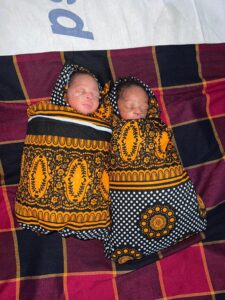Als ich 2019 das erste Mal nach Nyangao, Tansania reiste, war ich sehr aufgeregt. Meine Erwartungen waren geprägt durch Berichte von Wilhelm Humboldt und Albert Schweitzer. Karibu Sana stand auf einem kleinen Tischkärtchen im Schwester Thekla Konvent Mtwara, als ich ankam. Das Bild habe ich immer noch auf meinem Handy, weil mich das spirituell sehr berührt hat. Als es dann mit einem Jeep von Mtwara über die staubige Landstraße in Richtung Nyangao ging, fühlte ich mich fast schon wie eine Forscherin, die Afrika erkunden wird.
2024 im Advent war ich nun schon das 5. Mal in Nyangao. Die Ankunft ist aber immer noch aufregend. Das Nyangao aus den Erzählungen von Schwester Dr. Tekla Stinnesbeck der 60-iger Jahre hat sich verändert. Auch wenn in den ländlichen Regionen viele Dinge von den Menschen unverändert praktiziert werden, das St. Walburg Hospital jedenfalls entwickelt sich weiter. Das Krankenhaus will ein entscheidender Gesundheitsanbieter in der Region sein. Dafür muss hart an der Qualität gearbeitet werden. Die Herausforderungen sind immens, denn es fehlt an Geld, Ausstattung und Personal, um den Anschluss an die rasante Entwicklung in Medizin und Technik nicht zu verlieren. Gemeinsam mit Michael Dunst und meinem Mann Ralf Groß haben wir uns dieses Mal einem zentralen Vorhaben gewidmet – die Informationstechnologie (IT) unter die Lupe zu nehmen.
Die Zeit in Nyangao ist immer sehr intensiv. Neben der Unterstützung des gynäkologisch-geburtshilflichen Teams habe ich mich verstärkt mit der Datenerfassung beschäftigt. Das Wort „Datenerfassung“ löst bei vielen Menschen eine Abwehrreaktion aus, ist aber in einem Medizinbetrieb eine Schlüsselfunktion. Zu wissen, wie hoch die Patientenzahl ist, ist eine großartige Sache, um aber die Qualität der medizinischen Versorgung beurteilen zu können, muss viel mehr ins Detail geschaut werden. So ergaben die Blicke in die Daten der Geburtshilfe, wie auch in unserem Programm zum Screening auf Gebärmutterhalskrebs interessante Erkenntnisse. Als Stiftung können wir so mit diesem Wissen besser unsere Aktivitäten steuern, damit das bestmögliche Outcome erreicht werden kann.
Eine sichere Schwangerschaft und Geburt stehen nicht nur auf meiner Agenda ganz oben, sondern sind ein UN-Nachhaltigkeitsziel SDG 3. Das Geburtshilfe-Team in Nyangao ist täglich mit sehr komplexen geburtshilflichen Fällen konfrontiert und versucht mit den beschränkten Mitteln, das Beste für die Patientinnen rauszuholen. Ernste Schwangerschaftserkrankungen, ausgelöst durch Bluthochdruck sind in der Geburtsabteilung keine Seltenheit. Oft kommen deshalb die Kinder zu früh zur Welt oder sind schlecht entwickelt, selbst wenn sie um den Entbindungstermin herum geboren werden. Diese Komplikationen vorauszusehen und frühzeitig zu behandeln, ist möglich. In Ländern des globalen Nordens ist das die Normalität. Damit auch Frauen in und um Nyangao an dieser Normalität teilhaben können, brauchen wir noch Unterstützung von Menschen aus Deutschland.
Was mich besonders gefreut hat, waren die sechs Zwillingsgeburten in den knapp zwei Wochen, die alle gut verlaufen sind. Die Kinder und auch die Mütter konnten – obwohl einige von ihnen wegen ihrer Frühgeburtlichkeit einen schlechten Start hatten – gesund das Krankenhaus verlassen.
Dr. Solveig Groß
(Gynäkologin) ist seit vielen Jahren in den Projekten der Artemed Stiftung ehrenamtlich im Einsatz.





